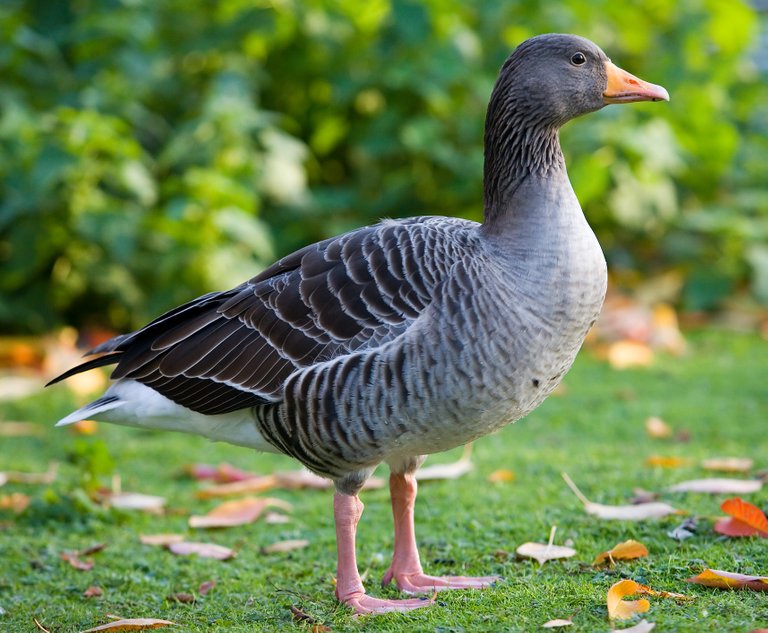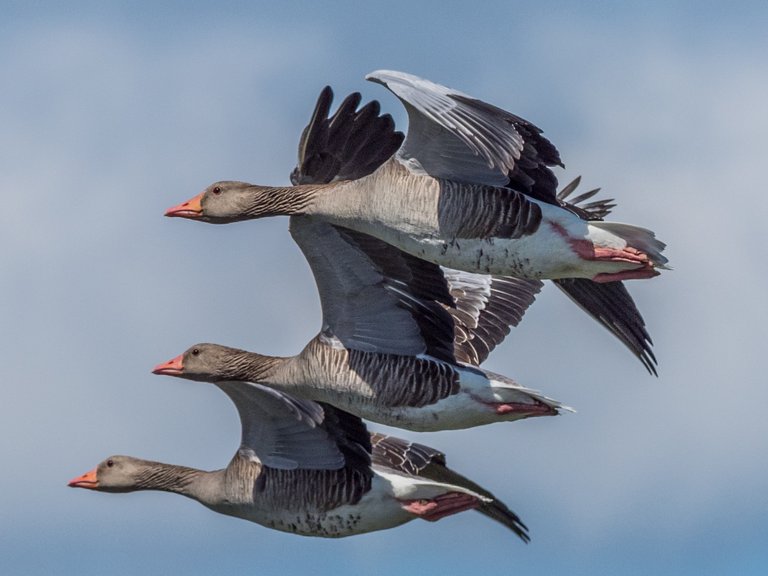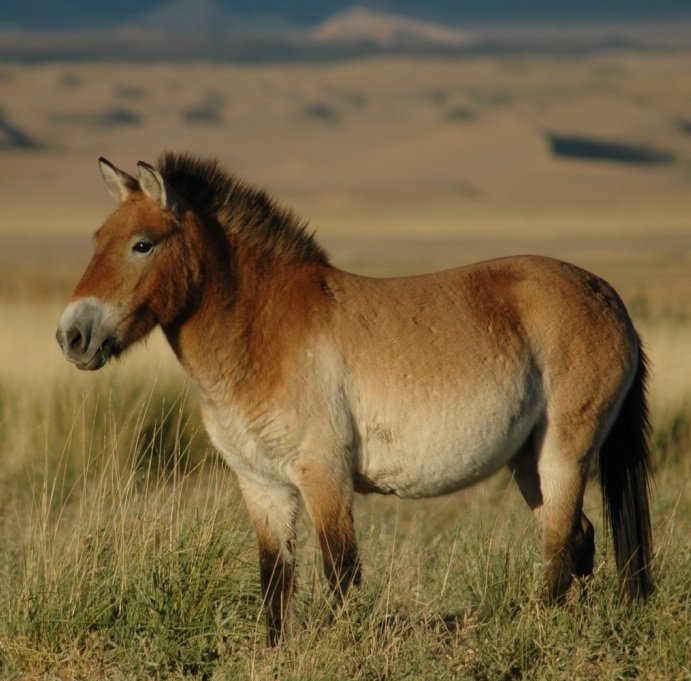Geese and many other species of waterfowl tend to stay in regions with harsh winter conditions, and scientists have recently taken a look at which mechanisms they use in order to cope with a very cold climate. These animals are endothermic animals, which means that that will have a constant body temperature. For reference, we humans and most mammals are also endothermic, so we will spend energy to keep ourself warm if we are out in the cold during winter.

A graylag goose. Image by David Iliff, posted with the Creative Commons Attribution-Share Alike 3.0 Unported license.
A research team lead by Dr Claudia Wascher of Anglia Ruskin University and carried out at the University of Vienna's Konrad Lorenz research station in Austria fitted small transmitters on 25 greylag geese (Anser anser) within a flock of 170 birds. These small devices would measure their heart rate and body temperature for 18 straight months, and the data collected from this could be used to calculate the energy expenditure of each individual goose.
What they found is that the geese exhibit winter hypometabolism as a way to reduce the energy they use. What this basically means is that they lower their heart rate, which in turn lower the body temperature and their metabolic rate. The average goose would lower its heart rate by 22 %, which lead to a body temperature that was 1° lower than the measured summer temperature.
Image by Bengt Nyman, posted with the Creative Commons Attribution 2.0 Generic license.
By having a lower metabolic rate, the geese would need to consume less energy, which is obviously more difficult to get their beaks on during the harsh winter compared to a nice, hot summer day. A difference in only one degree does certainly not seem like very much, but everything helps when you are living with limited resources.
It's also interesting to keep in mind that the animals for the experiment received food during the winter, which means that their lower body temperature was not because of food shortage, but rather a built-in feature of the goose itself that it uses whether it needs it or not.
The same behavior in other animals
Geese are not the only animal that are able to have a lower heart rate and lower metabolic rate during the winter. The feature has already been found in the alpine ibex and the red deer, but it is the first time it has ever been documented in a bird.
Scientists have believed that the Przewalski’s horse, the wild ancestor of the domestic horse had this ability, but studies have shown that most horses do not exhibit this behavior, and it was expected to have been lose during the genetic change that changed them from the Przewalski’s horse to the domestic horses. However, recent studies have shown that the Shetland pony still has this ability.

A Przewalski’s horse. Image by Claudia Feh, posted with the Creative Commons Attribution-Share Alike 4.0 International license.
It will be interesting to see if more studies reveal that this feature is used by more animals than we expect, but it still seems like that it is a pretty rare ability.
Thanks for reading
I hope you enjoyed learning about the metabolic reduction of geese during harsh winter conditions. As always, make sure to check the sources in the text to learn more about the research! Oh, and have a nice weekend everyone :) I'm a little behind with upvoting and answering all comments on my previous two posts, but don't worry, I'll get to it soon enough!
Great article as always. I have read that we humans also can lower our heart rate. Freedivers heart rate can drop to below 40 bpm:
https://www.redbull.com/int-en/see-this-guy-s-heart-rate-go-to-37-beats-per-minute
Also:
Swimming in ice cold water can also lower the human core body temperature without suffering from hypothermia according to this article:
https://www.ncbi.nlm.nih.gov/pmc/articles/PMC4524884/
Oh wow, that's very interesting. I had no idea that we humans could also lower our heart rate if we swim in cold water, but I guess it makes sense. However, I would expect my heart to go crazy fast if I swam in ice water!
This comment thread reminds me of the Wim Hoff method which I recently came across after reading a book called "What Doesn't Kill Us." Although it's not entirely based around the same exact principles, Through the breathing methods that they use according to the book I'm certain the heart rate is affected. The main premise behind this method is triggering what most would consider a vestigial brown fatty tissue that we supposedly lose function over after being a baby.
Some details are here: https://www.scientificamerican.com/article/supercharging-brown-fat-to-battle-obesity/
Although it's not entirely the same a s what Geese use, I'm certain all animals (including us) have essential biological thermostat boosters... that is.. beyond the pituitary and hypothalamus of course . .. Hoff suggests that the only reason we get so cold in the winter is because we have made our modern life like a perpetual summer. Controlled temperatures inside. Layers and layers of clothing... I originally came a cross it when I was studying cold showers and their potential to help drain the lymphatic system, but this talk about brow fat blew my mind.
@valth Perhaps you could make an article on so called "vestigial" organs or perhaps other methods of maintain homeostasis through extreme conditions? I'd like to hear your take on whether you believe there is such a thing as an organ in our bodies that doesn't have a function or not. I know you focus mainly on animals, but it's not too far off of left field. Great post!
Thanks for adding even more information about this, @thegreatlife! This is a really interesting topic, and I must sadly admit that I don't think I have the knowledge to be able to make a good post about the topic you suggest. The only fields I have experience in is ecology, microbiology, conservation biology, and some genetics, so I feel like this is a bit out of my comfort zone. But I might look into it when I have some spare time to see if I'm able to wrap my head around it.
And again, thanks for leaving great comments!
Glad to be a help. I am always listening to audio books on this kind of stuff and I read in my spare time. I'm very interested about about different animals and their place in the world. I'm especially interested in dolphins and their communication systems. Sometime in the future, I'll make a post about either prairie-dog communication, or dolphin interaction. I bet you'd get a kick out of it.
The topic of how animals communicate is actually really interesting, so I'm looking forward to seeing your post about it! There are so many different forms of communication, and many species have solved the "communication problem" differently.
Lowering 22 % heart rate is a big number. It's a great ability to lower heart rate to such an extent.
Beside lowering the and hypometabolisim for their survival in winter. There are a lot of birds like geese, houbara bustards, cranes, teals, pintails, mallards, spoon bills, waders and pelicans, migrate from cold region in search of moderate temperature. About one million birds from siberia use the Indus Flyway, also known as the International Migratory Bird Route Number 4, covering a distance of about 4,500km. The migratory birds start their journey from siberiain september, october and return back to siberia in March,April
Yeah, migrating further down south is always a great solution! It's actually very nice to live in a place where the birds migrate away during winter, and the few species that stay behind get lots of food from the people here in order to help them :)
Yeah, migrating bird from Siberia not only add colors but also provide ecological benefits as they prey on insects and weeds, thus contributing towards the betterment of agriculture.
absolutely right the remaining birds get maximum share of food so there is a win-win situtaion for migratory and remaining birds.
Exactly. Sadly, the mortality rate of some of the birds that stay behind in the winter is very high!
Being A SteemStem Member
Thanks for the advice, I'll make sure to check it out :)
One thing I always found neat in animals trying to protect themselves from the cold is counter current heat exchange. I remember learning that waterfowl have it in their feet as a means of protection from contact with the frozen water on which they walk. Basically, their blood vessels are arranged in such a way that the warm blood from their heart is flowing next to the cold blood at their feet. It is a neat feature I wish my fingers had in the winter! As always, great article and thanks for sharing @valth !
You're right, and this is a very cool adaptation that some species have created to cope with the cold conditions. There are also many other cool adaptations to surviving the cold, such as having hollow feathers/fur, having extra layers of fat, have reduced size of feet and arms to reduce heat loss etc.
"By having a lower metabolic rate, the geese would need to consume less energy," lol. so do they loose weight during winter season?
Yes, but by lowering their metabolic rate they will lose less weight compared to if they had kept their normal metabolic rate. And thus needs to eat less in order to survive.
Wow... That's a great discovery.. How do they lower their heart rate? ... Its amazing... Nice post... So enlightening..
I have no idea how they do it! It is probably not something they do consciously though, and rather something that happens automatically.
Am not so much of a geese fan but i so love horses. There are like a bunch of things i didn't until now. I really appreciate this post @valth
I'm glad you learned something new, @sandyk!
wawoow fabiliously done geese low their heart rate but sir if they do they must effect their bodies isnt it?
Sure it affects their body to a certain extent, but it probably doesn't really have any negative effects, at least not that I am aware of.
yap ur right they can survive atleast thats the best thing!
Great post... You must have studied a lot about geese.... I'll follow u for more
Thank you. No, I haven't really studied geese that much, just animals in general :)
That's great .... Kindly check out my post too...!👍
Resteem! Up vote!! Promo-steem!!!
Thanks bro
Geese are very defensive of their nest and kin. This is because geese mate for life and if one partner dies the other one is alone. Also they are very defensive of their egg/chicks for this same reason. Hence the reason not to mess with geese.Thanks @valth for the info on Geese, Here I want to add something that
Thanks for adding extra information about geese :)
Wow... Beautiful post. Tnx I've actually learnt a lot today @valth
I'm glad to hear that you learned something new today, @haoma :)
Wooow! wonderful information thanks for sharing its good for me to know some thing new from your post good work I wish you all the best
You're welcome, and I'm glad you learned something new today :)
if you can visit to my postamazing picture @valth
No, I don't visit the blog of people that are spammers. Sorry!
different informations. thanks for us sharing.
You're welcome!
i need time to read this ... after few minutes ...
Sure, take all the time you need ;)
Aww this is sOoOo Cute lOvely graylag goOse. That's ana amazing thery are reduce body temperature during winter to save energy. It's so interesting history about this species.
Last One in picture Przewalski horse beautiful
Yeah, those horses are really beautiful! I'm also glad to hear that you liked the post about the geese :)
Very good and interesting research friend that helps to know that kind of goose that I did not know thanks porder know their metabolic behavior is great to know that type of horse is excellent magnifico congrats excellent post greetings
I'm glad you liked it :)
I know this bird but i always knew its name in urdu .Today i got an opportunity to read in detail about geese :)
I'm glad you took the opportunity to learn more about them :)
Your Post Has Been Featured on @Resteemable!
Feature any Steemit post using resteemit.com!
How It Works:
1. Take Any Steemit URL
2. Erase
https://3. Type
reGet Featured Instantly – Featured Posts are voted every 2.4hrs
Join the Curation Team Here | Vote Resteemable for Witness